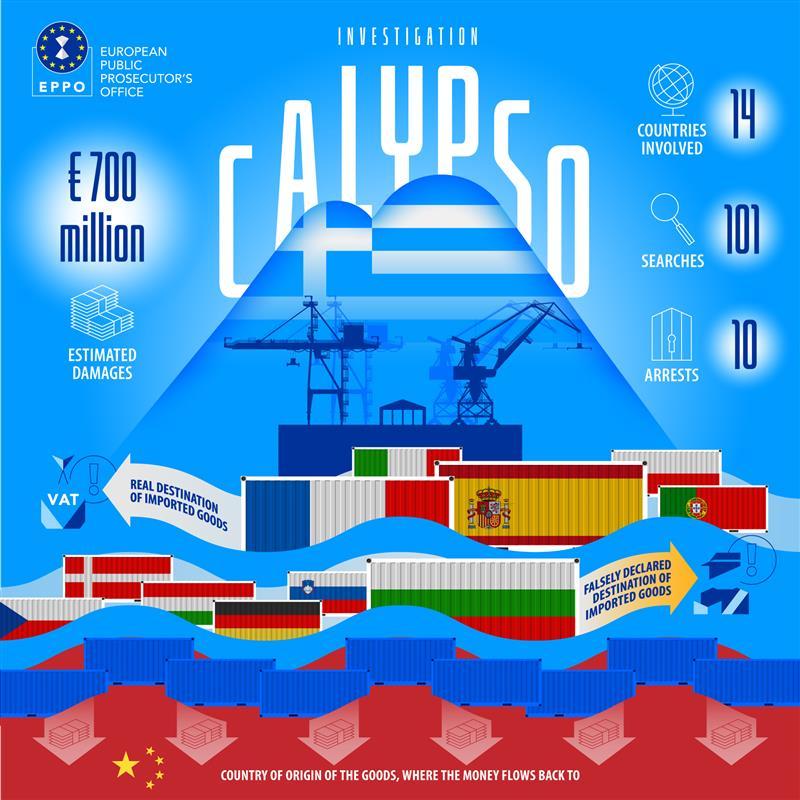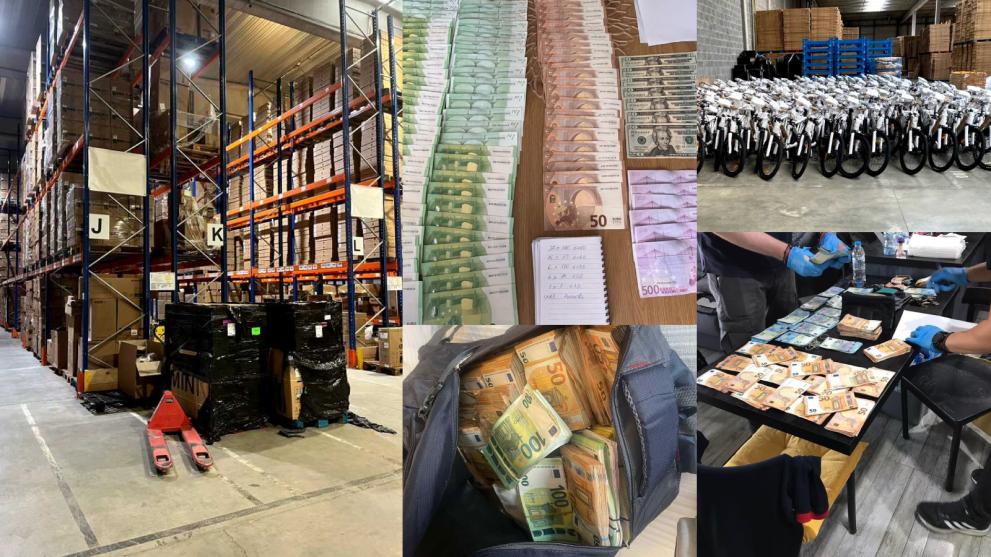
Tons of goods illegally imported through port of Piraeus, €700 million in losses
(Luxembourg, 26 June 2025) – A coordinated raid by the European Public Prosecutor’s Office (EPPO) in Athens (Greece), Madrid (Spain), Paris (France) and Sofia (Bulgaria) has dealt a significant blow to criminal networks flooding the EU market with goods fraudulently imported from China, while evading custom duties and VAT. The criminal scheme, which involved the massive importation of textile, shoes, e-scoters, e-bikes and other goods, is believed to have caused an estimated damage of approximately €700 million.
The investigation carried out by the EPPO, code-named ‘Calypso’, spans 14 countries: Bulgaria, China, Czechia, Denmark, France, Germany, Greece, Hungary, Italy, Poland, Portugal, Slovakia, Slovenia and Spain. A total of 101 searches were conducted yesterday at the offices of customs brokers, companies controlled by the organised criminal groups under investigation, the premises of the suspects, and at the offices of tax advisers and representatives, lawyers, accountants and transport companies, in Bulgaria, Greece, France and Spain. Ten suspects were arrested, including two customs officers. In addition, firearms and cold weapons were found and seized in the houses of three of the suspects.
Law enforcement agents seized €5.8 million (of which €4.75 million in Greece and the remaining in France and Spain), in different currencies, including Hong Kong dollars, euros in digital wallets and cryptocurrencies. In addition, 7 133 e-bikes and 3 696 e-scooters were secured, as well as 480 containers for further checks and verification in the Port of Piraeus. Eleven properties located in Spain were also seized, as well as 27 vehicles and luxury items (bags, watches and jewellery). Freezing orders were also issued in Greece to seize real estate, boats and bank accounts.
At issue are several criminal networks, mainly controlled by Chinese nationals, that handle the full circuit of the goods imported from China into the EU market, including distribution to different Member States and sales to end customers, as well as money laundering and sending the profits back to China, while defrauding the payment of customs duties and committing large-scale VAT fraud.
How it works
The fraudulent scheme starts with the introduction of the goods from China into the EU, mainly through the port of Piraeus (Greece), with a substantial undervaluation or misclassification of the goods, in order to evade custom duties – using false documents to conceal the true value and nature of the merchandise. A network of professional enablers operating at the customs entry point, such as customs brokers, service providers and accounting firms, facilitate the initial clearance, and the apparent purchase and transport of the merchandise by companies mainly registered in Bulgaria, but operating in Greece with a Greek VAT registration number.
The goods are subsequently sold to companies established in other Member States, thus allowing the first apparent purchaser to benefit from a VAT import exemption based on Customs Procedure 42 (CP42). This procedure, created to simplify cross-border trade, exempts importers from paying VAT in the country of importation, if the imported goods are subsequently transported to another EU Member State.
Through a chain of buffer and shell companies, the goods are apparently sold to companies in specific Member States, where they are supposed to be sold on the market. These fraudulently declared destinations include Bulgaria, Czechia, Denmark, Germany, Hungary, Italy, Slovakia, Slovenia and Spain. However, these fake ultimate acquirers of the goods never receive the merchandise, and operate as a missing trader, thus not paying VAT. In some cases, the criminal organisations used identity documents from legitimate companies, fraudulently hijacking their VAT numbers to conceal the true destination of the goods.
In reality, after the goods enter the EU, they are stored in warehouses and places controlled by the criminal organisations, and from there they are transported, using false documents, to France, Italy, Poland, Portugal and Spain (the real countries of destination). These Chinese logistics centres, where all goods are stored, operate as highly controlled warehouse districts, functioning almost like exclusive communities, accessible only to members of the criminal groups managing them.
The transport documents are destroyed as soon as the goods are delivered, and the merchandise is sold to end customers mostly on the black market, in cash, as part of a highly concealed parallel economy.
One-stop criminal enterprise
The criminal organisations under investigation are in charge of producing the false invoices and transport documents to conceal the real destination of the goods, and to recruit a large network of sham companies used for the fake sales and deliveries, in order to hide the whole fraudulent chain. This allows the companies controlled by the criminal organisations to sell the products at a very competitive price, since VAT remains unpaid and customs duties and anti-dumping fees are largely evaded.
Finally, the proceeds of the crime are transferred to China using different money laundering techniques, including providing money laundering services to other criminal organisations via trade-based underground banking systems. In this way, the organised criminal groups control and conceal the whole criminal chain, from the initial fraudulent import to the VAT fraud, and from the sale of the goods to the laundering of the profits.
The total damage of the criminal activities under investigation is currently estimated at approximately €700 million: over €250 million come from evaded customs duties (which revert entirely to the EU budget), and close to €450 million from unpaid VAT (which damages both the EU budget and the national budgets of Member States). The damage caused by the fraudulent scheme under investigation is likely much higher. Greece’s Independent Authority for Public Revenue (AADE) is also actively supporting the EPPO to further evaluate the extent of the damage in evaded customs duties.
This EPPO-led investigation was supported by Europol through analytical assistance, coordination via a Virtual Command Post, and the deployment of an expert to the command centre in Luxembourg, with additional backing from national law enforcement agencies – highlighting the value of cross-border cooperation against organised crime. The European Anti-Fraud Office (OLAF) contributed to the detection.
All persons concerned are presumed to be innocent until proven guilty in the competent courts of law.
The EPPO is the independent public prosecution office of the European Union. It is responsible for investigating, prosecuting and bringing to judgment crimes against the financial interests of the EU.
List of most important partners and national authorities involved:
- Europol
- European Anti-Fraud Office (OLAF)
- Hellenic Internal Affairs Agency of Law Enforcement Bodies (Υπηρεσία Εσωτερικών Υποθέσεων Σωμάτων Ασφαλείας)
- Hellenic Police's Digital Forensics Investigations and Analysis Subdivision (Υποδιεύθυνση Ψηφιακής Εγκληματολογικής Έρευνας και Ανάλυσης της ΔΕΕ)
- France’s National Anti-Fraud Office (Office National Antifraude – ONAF)
- Bulgaria’s State Agency for National Security (ДАНС); National Investigation Service (Национална следствена служба); General Directorate National Police) Главна дирекция “Национална полиция”) and General Directoratе Gendarmerie and Specialised Counter-Terrorism Department (Главна дирекция “Жандармерия и специализан отряд за борба с тероризма”)
- Spain’s National Police and Tax Agency (Policía Nacional and Agencia Estatal de Administración Tributaria)

